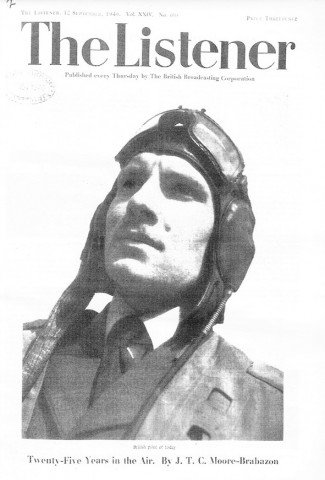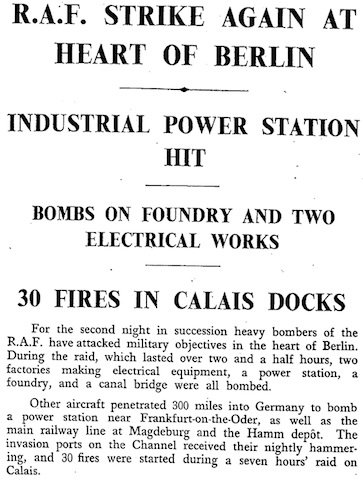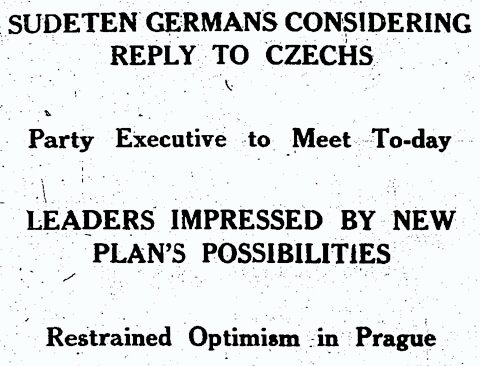Today I'll take a break from the press and look at The Listener. This was a weekly publication of the BBC, a higher-brow companion to the Radio Times. Both carried listings of the week's radio programmes, but whereas these are the main focus of the Radio Times, The Listener confines them to half a page towards the back. The bulk of the magazine consists of the texts of some of the previous week's more intellectual broadcasts, as well as original articles, book reviews, recipes (I'll spare you the one for sheep's head curry) and a famously difficult crossword.
There are a couple of articles of interest today. One is the cover article, 'Twenty-five years in the air' by J. T. C. Moore-Brabazon. (The cover shows a 'British pilot of today'.) It's an odd title: he says 'It is not very long ago really since we have been able to fly -- about twenty-five years' (367), i.e. 1915. Moore-Brabazon would have known this was a little inexact, since it was over thirty years since he himself was the first Englishman to fly (in England at least), back in May 1909. Perhaps he didn't like to think about his age.
Anyway, the article is mainly about aerial warfare and how it has changed in that time (which makes 1915 a bit more sensible as a starting point). Moore-Brabazon (ex-RFC himself) talks about the origins of the word 'archie', meaning anti-aircraft fire (from a popular song, 'Archibald, Certainly Not!') and the Constantinesco gear. He passes quickly over the interwar years and comes to the present war, where he notes the enormously greater numbers of aircraft involved, as well as their far greater speed: but those who predicted that dogfights were a thing of the past have been proved wrong. He credits the Americans with having 'accidentally' invented the modern bomber: 'Generally, bombers are all adaptations of this original American Douglas commercial aircraft', with variable pitch propellers, retractable undercarriage and 'the flap which enabled you to glide down at a coarse angle so as to land in a small aerodrome'.
Moore-Brabazon comes to the conclusion that today,
daylight bombing raids are an expensive form of amusement as the bombers cannot defend themselves efficiently against the fighter.
But it's very different at night (368):
Here there is practically no reply. Searchlights and anti-aircraft guns are a deterrent, but it is useless to risk using fighters in large quantities in the blackout with all the dangers of crashing on landing. Ferreting out obscure corners of Europe by night to bomb is a very specialised business, and here again our training has been extremely wonderful.
So aerial warfare today is really no longer a contest between armed forces, but 'between the staying powers and the manufacturing powers of the people'. Eventually one side will wear down the other, which alone will be able to manufacture the bombers to continue fighting. As to the future:
After this war I believe that the English-speaking nations and anybody else who in good faith is prepared to join, will have to say to the world at large and all nations, that never again is any independent State to produce war aircraft. Military air power should be vested in the world policeman, who will guarantee all countries from aggression. This force would be mobile, efficient and overwhelming. Commercial aviation can continue; it must always be limited to what is called performance by economic considerations.
But the world's fighters and the world's real big bombers ought no longer to be made in any country planning world aggression. Kipling's A.B.C. must be born, and police the world.
The other article is the text of a broadcast made by Air Marshal Sir Philip Joubert on 5 September, here given the title 'Blitzkrieg bulletin'. Joubert was another RFC veteran: in fact he flew one of its first wartime sorties. At the start of the present war he was Air Officer Commanding India. At some point along the line he must have developed a talent for oratory, because in 1940 he spoke often on the BBC and his talks were well-received. This time he begins by saying
When the aerial Blitzkrieg started it was not quite clear at what objective the Germans were aiming. This is now quite clear. The enemy appears to have made up his mind that a necessary prelude to a successful invasion of this country is the achievement of air superiority.
Joubert then summarises the various phases of the German offensive thus far (as I will not!) The most recent phase he highlights is interesting, given that he was speaking two days before 7 September:
And now night bombing on a large scale is in progress. At times two or three hundred aircraft have been employed on one night. A good deal of damage has been done and a number of people have been killed or injured.
Even more interesting is his forthrightness about British night defences:
So far we have not been very successful.
At least for a time, the Germans will probably bomb even harder, both by day and by night.
But we must try to stick it. It is, and will be, a most unpleasant proceeding, exasperating, very trying and fatiguing. But remember that the German people have been enduring really heavy bombing since the middle of May, nearly two months longer than you have had to put up with it. And we are not going to show ourselves less capable of bearing this burden than the German people.
Joubert 'cannot imagine' that Germany will not attempt an invasion, after all the boasts it has made so far. But it can't be done successfully without air superiority. To this end he exhorts
every man and woman in the country who is in any way connected with the production of the resources which Fighter Command requires to maintain that high standard of devotion to duty which has been such a feature of our industrial and service life during the past two months.
I think I can see why the BBC's audience like Joubert: he was a straight talker who respected them, both for their capacity to hear the hard facts and for their contributions to the war effort. Moore-Brabazon was a politician; his article (not broadcast, I think) seems to have somewhat more cant. How was his call for a post-war international air force received? Unfortunately I don't know.
![]() This work is licensed under a Creative Commons Attribution-NonCommercial-NoDerivatives 4.0 International License.
Permissions beyond the scope of this license may be available at http://airminded.org/copyright/.
This work is licensed under a Creative Commons Attribution-NonCommercial-NoDerivatives 4.0 International License.
Permissions beyond the scope of this license may be available at http://airminded.org/copyright/.





